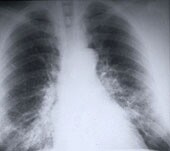
WEDNESDAY, March 24 (HealthDay News) — Chemotherapy improves survival for patients with operable non-small cell lung cancer, say researchers who reviewed nearly 50 studies.
The first meta-analysis of 34 studies involving almost 8,500 patients (and more than 3,300 deaths) showed that survival at five years was 64 percent for patients who had chemotherapy and surgery, and 60 percent for patients who had surgery alone.
The second meta-analysis of 13 studies with 2,660 patients (1,909 deaths) showed that survival at five years was 33 percent for patients who had surgery plus radiotherapy and chemotherapy, and 29 percent for patients who had surgery plus radiotherapy alone.
The report was released online March 23 in advance of publication in an upcoming print issue of The Lancet.
“In both meta-analyses we noted little variation in effect according to the type of chemotherapy, other trial characteristics, or patient subgroup,” wrote the British and French researchers.
According to a team led by Sarah Burdett of the Medical Research Council Clinical Trials Unit, London, adding in chemotherapy boosted outcomes whether or not patients got the treatment alongside surgery alone, or surgery plus radiotherapy. They contend that, in patients deemed suitable, “platinum-based chemotherapy should be considered for patients at high risk of recurrence — i.e., those with stage 1B, 2 or 3 disease.”
The finding supports the use of chemotherapy in patients with non-small cell lung cancer who have also undergone tumor-removing surgery, Dr. Gregory P. Kalemkerian, of the University of Michigan, wrote in an accompanying commentary.
“Although the survival benefit seems small, worldwide adoption of adjuvant chemotherapy could save up to 10,000 lives every year,” he said.
More information
The U.S. National Cancer Institute has more about non-small cell lung cancer.

